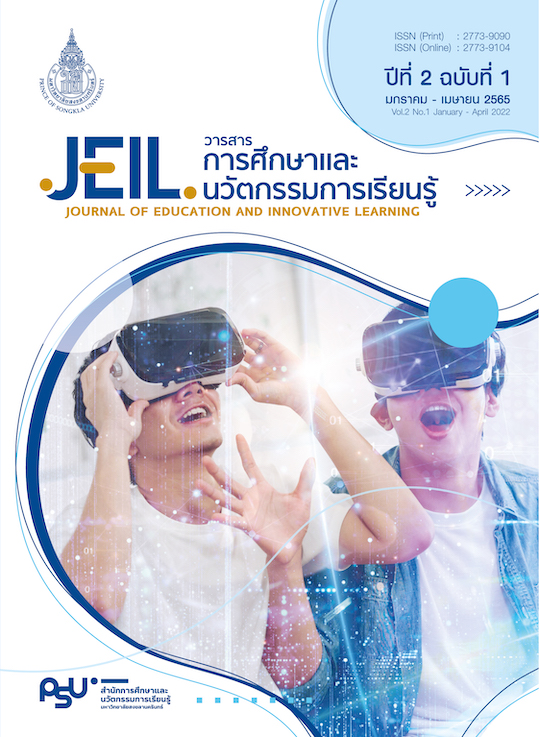Developing Learners’ Competency through Project-based Learning, Case Study: Digital Marketing and Management Course, Faculty of Commerce and Management, Prince of Songkla University, Trang Campus
Main Article Content
Abstract
The aims of this study were to 1) study learning process using project-based learning 2) explore learning effects to develop students’ competency of conducting project-based learning, and 3) study the satisfaction of learners with the project-based learning. The population of the research were 87 fourth-year undergraduates majoring in the Information and Computer Management program. The research instruments were an online questionnaire to investigate educational achievement and a student satisfaction assessment form. The statistics used for data analysis were mean and standard deviation. The first research finding was, using project-based learning process which consisted of collecting digital marketing needs from business owners, digital marketing planning and operation, online marketing presentation of project progress and results, and discussion in digital marketing techniques in the classroom, students possess digital marketing skills and learning skills such as creativities, critical thinking, collaboration, and communication. The second research finding was, the verification of students’ educational achievement was at the highest level. The third research finding was, students had the highest level of satisfaction toward the project-based learning. The results show that project-based learning is an appropriate teaching method that can enhance the learning skills of learners.
Article Details

This work is licensed under a Creative Commons Attribution-NonCommercial-NoDerivatives 4.0 International License.
The contents and data in published articles in the Journal of Education and Innovative Learning are considered the ideas and responsibility of the author(s). The Editorial team does not necessarily agree with any ideas or hold mutual responsibility of them. Plagiarism is not permitted, even for academic purposes. However, proper citation must be given whenever referencing the articles.
References
Art-in, S., & Netthanomsak, T. (2011). Project-based learning in curriculum development course for five-year bachelorís degree students. KKU Research Journal, 1(1), 1-16. [in Thai]
Bloom, B. S., Engelhart, M. D., Furst, E. J., Hill, W. H., & Krathwohl, D. R. (1956). Handbook I: cognitive domain. New York: David McKay.
Kongyoo, P., Chaiprasert, P., & Phibranchon, S. (2019). Learning management using project-based learning activities on "Work and Energy" case study, Mathayomwatkhaosukim school. Saeng Isan Journal, 16(2), 50-68. [in Thai]
Kusirirat, K., & Nuchprayoon, N. (2019). The effects of learning activities by project-based learning in sound and video editing course of undergraduate students. Dhonburi Rajabhat University Journal, 13(1), 139-153. [in Thai]
Kwankaew, P., Vanichvasin, P., & Siripipattanakoon, S. (2016). Development of creative characteristics using project-based learning (PjBL) for High Vocational Students of Program in Secretarial. Journal of Southern Technology, 9(1), 1-6. [in Thai]
Lahtam, P. (2020). Project-based learning management with academic achievement in food preservation, learning subject careerand technology for students in Mathayom Secondary 1. Journal of Education, Prince of Songkla University, Pattani Campus, 32(3), 187-199. [in Thai]
Mungphingklang, A., & Doungwilai, D. (2019), Effects of project-based learning management on sentence type of grade 2 secondary school students. Walailak Journal of Learning Innovations, 5(1), 85-100. [in Thai]
Office of the Basic Education Commission. (2021). First step of project-based learning. Bangkok, Thailand: N.A.Rattana Trading. Retrieved from https://www.obec.go.th/archives/510216 [in Thai]
Office of the Education Council. (2007). Guidelines for learning management student-centered learning: Project-based learning management. Retrieved from http://backoffice.onec.go.th/uploads/Book/365-file.pdf [in Thai]
Office of the National Education Commission. (2003). National Education Act, B.E. 2542 (1999) and Amendment (Second National Education Act B.E. 2545 (2002)). Bangkok, Thailand: Pimdeekarnpim. [in Thai]
Panich, V. (2012). Way of learning for students in the 21st century (3rd ed.). Bangkok, Thailand: Tathata Publications. [in Thai]
Plitakul, P. (2017). Learning management based on project-based learning for music teaching experiences of current students at the Faculty of Music, Silpakorn University. Veridian E-Journal, Silpakorn University, 10(2), 694-708. [in Thai]
Prakrongjai, P. (2019). Project-based learning in traditional folk media for communication. Journal of Mass Communication, 7(2), 68-84. [in Thai]
Prakrongjai, P. (2020). Project based learning. Silpakorn University Journal, 40(1), 155-163. [in Thai]
Promkutkeaw, T. (2014, May-June). Introduction to project-based learning management. IPST Magazine, 42(188). Retrieved from https://emagazine.ipst.ac.th/188/IPST188/assets/common/downloads/IPST188.pdf [in Thai]
Pukiat, L. (2009). Project-based teaching and research-based teaching: tasks that teachers in the elementary school can do. Bangkok, Thailand: Saha & Sons Printing. [in Thai]
Rittibul, P., & Inthachote, S. (2020). The results of project-based learning in training techniques of music and drama of thai classical dance educationís undergraduate students rajamangala university of technology thanyaburi. Journal of Fine Arts Research and Applied Arts, 7(1), 89-106. [in Thai]
Yoelao, D., et al. (2014) The study of PBL-based learning management from the Knowledge Building Project to enhance the skills of the 21st century of children and youth: based on the success experiences of Thai schools. Bangkok: Limited Partnership Thippawisut. [in Thai]


